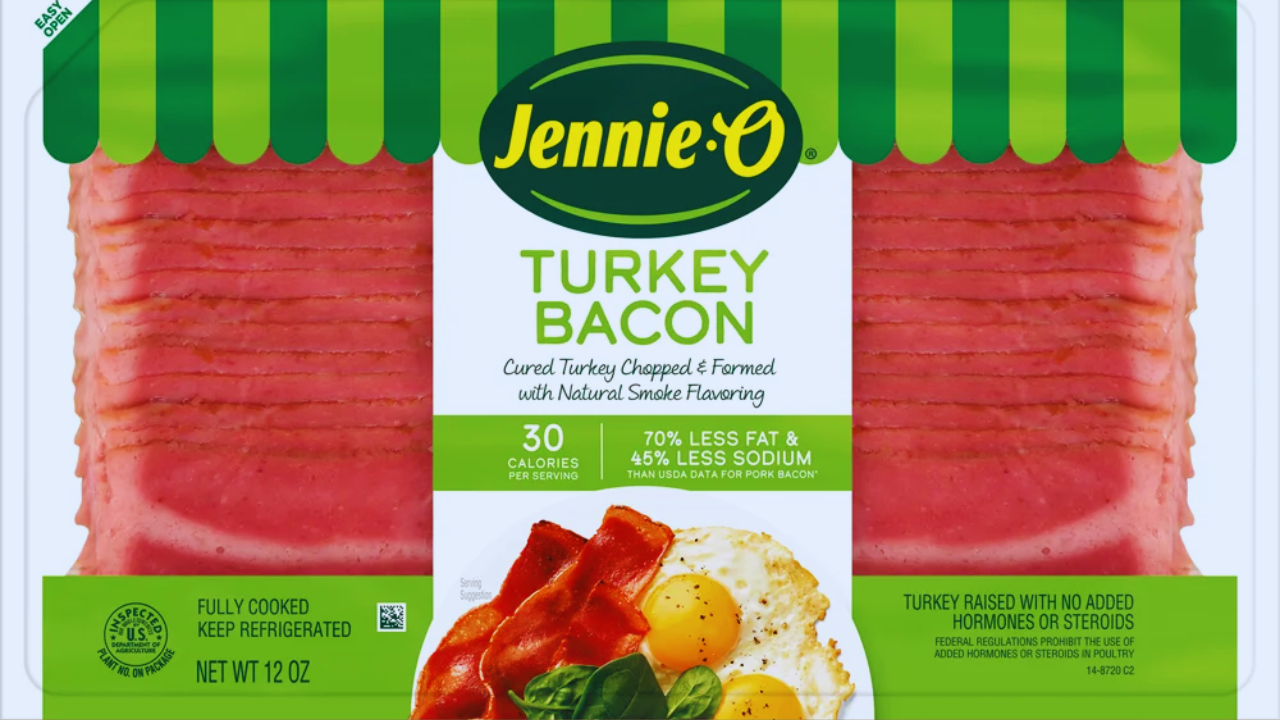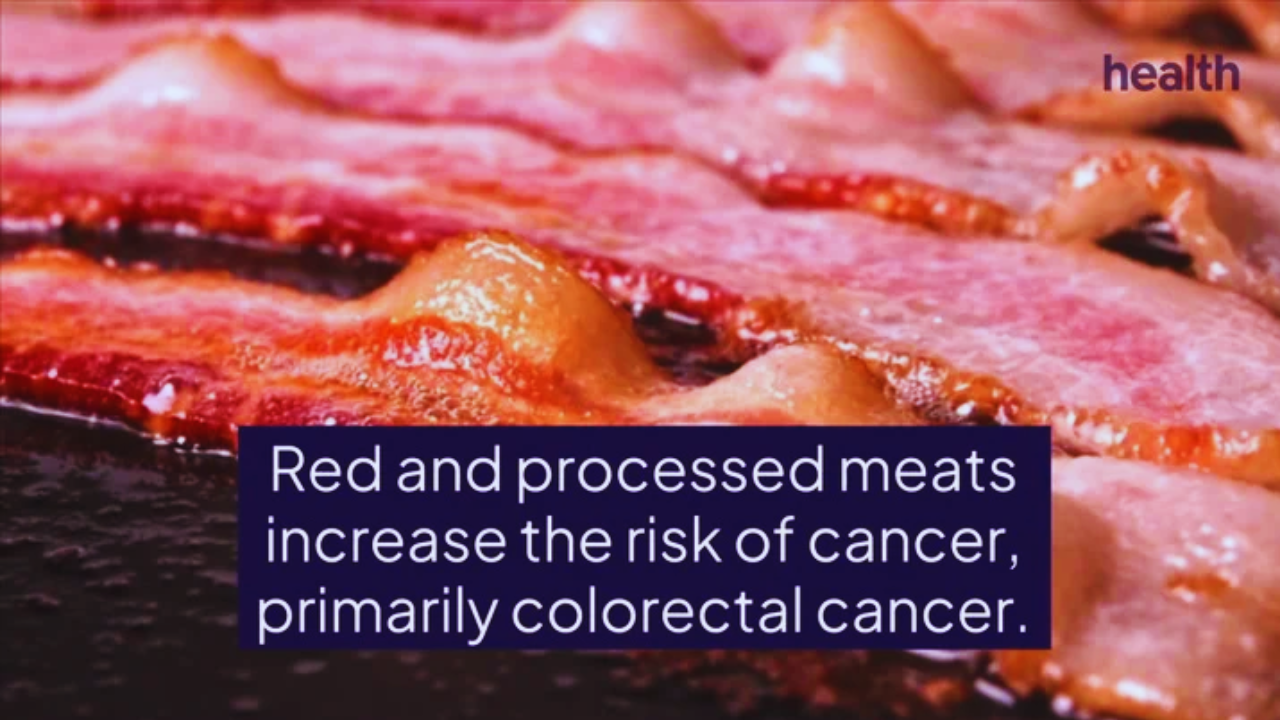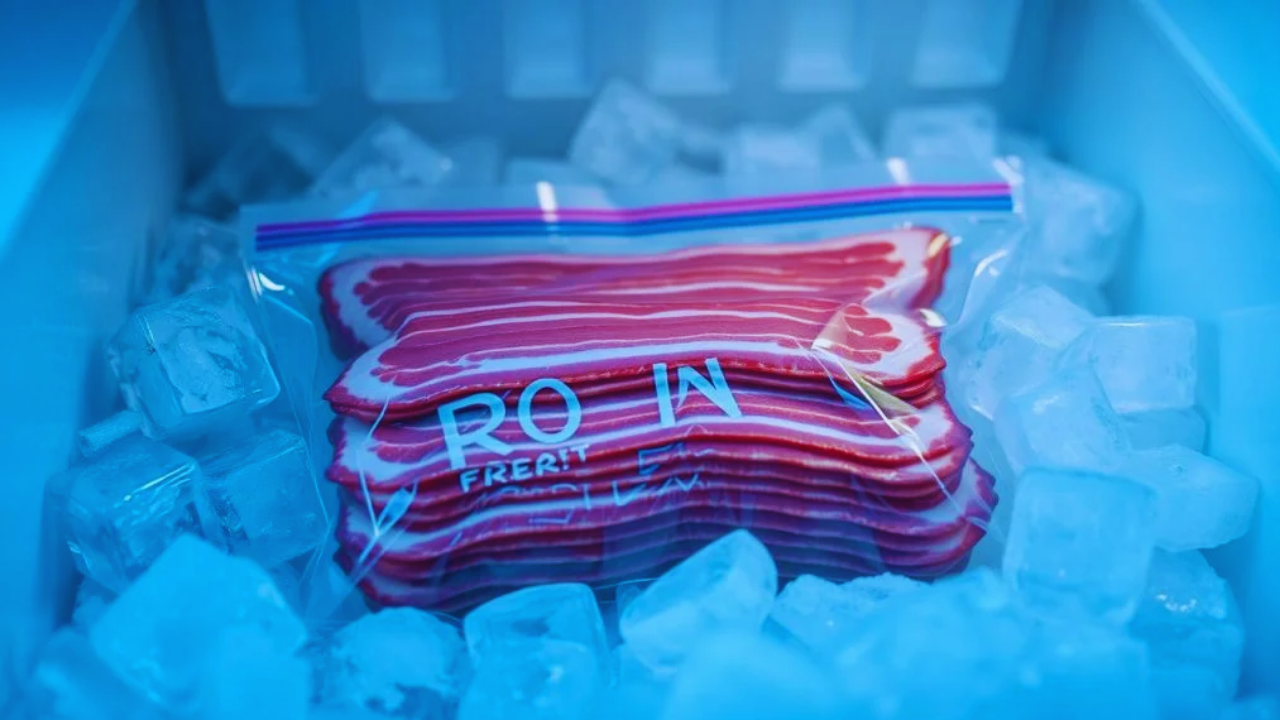
If you are a bacon lover, you might think that “real” bacon can only come from pork. However, many people are choosing turkey bacon as a healthier option for the traditional breakfast meal.
Turkey bacon is created by forming a seasoned blend of finely diced turkey into strips that look like regular bacon. Although it has less saturated fat and fewer calories than pork bacon, it is still a processed meat. As Turkey bacon contains nitrates, saturated fat, and sodium, it’s best to eat it in moderation.
This article explores the turkey bacon nutrition profile to see if it is indeed a healthier option.
Overview of Turkey Bacon
Turkey bacon is a popular alternative to pork bacon and can be found in most grocery stores. It is made by grinding or chopping turkey meat, mixing in preservatives and seasonings, and then shaping it into strips that resemble bacon.
Some manufacturing companies even use a mix of dark and light turkey meat to give it a look similar to traditional bacon. You can cook turkey bacon just like you would with regular bacon. It is generally fried in a pan, baked in the oven, or microwaved until it turns crispy and golden.
Turkey Bacon Nutrition Information

According to the USDA, below are the turkey bacon nutrition facts for one slice (8.1g) of turkey bacon cooked in the microwave.
- Sodium: 164 mg
- Calories: 30
- Protein: 2.39 g
- Fat: 2.1 g
- Carbohydrates: 0.34 g
- Sugars: 0.34 g
- Fiber: 0 g
Protein
With 2.39 grams of protein per serving, turkey bacon adds a good amount of protein to your diet each day.
Fats
In one slice of turkey bacon, you will find between 2.1 grams of fat. This fat content is roughly divided into one-third saturated fat and two-thirds unsaturated fat.
Carbohydrates
Turkey bacon is made entirely of meat, aside from the added preservatives and flavorings, and contains almost no carbohydrates. Some manufacturers may include up to 1/2 gram of carbs for every two slices due to added sugar for sweetness.
Preservatives
Pork and turkey bacon products also have preservatives like nitrites or nitrates. This helps keep the meat from spoiling, gives it a pink color, and adds to the flavor. Organic or natural bacon products don’t use synthetic preservatives. Instead, they often use celery powder, which naturally contains nitrates, to preserve the meat.
Minerals and Vitamins
Sodium holds the main nutritional value of turkey bacon. Depending on its processing, turkey bacon can have up to around 328 milligrams of sodium, which is about 14% of the recommended daily intake (RDA). If you’re on a low-sodium diet, it’s important to watch how much turkey bacon you eat.
While sodium levels can vary by brand, turkey bacon usually has only slightly less sodium than pork bacon. Besides sodium, turkey bacon nutrition also contains small amounts of B vitamins and zinc. However, regular bacon tends to have more niacin, selenium, and vitamin B12.
What Are The Different Types of Turkey Bacon?
There are two main types of turkey bacon, each made from different parts of the turkey. The first type uses a blend of dark and ground white meats from various parts of the bird. This mixture is seasoned and then cut into strips.
The second type is created from larger pieces of dark meat, specifically from turkey thighs. These pieces are mixed with a flavoring solution until they stick together as a solid mass, which is then cut and packaged.
Advantages of Turkey Bacon Nutrition
Turkey bacon can be an excellent choice for some individuals, particularly people with specific dietary requirements.
Less Fat and Calories Compared to Pork Bacon
Turkey bacon nutrition contains about 35% less saturated fat and 25% fewer calories compared to pork bacon. This makes it an excellent option for those monitoring their fat or calorie intake.
Despite this, turkey bacon is still comparatively high in calories, with each slice containing 30 calories, and over half of it comes from fat. While it is lower in calories compared to pork bacon, it’s important to consume turkey bacon in moderation.
A Great Choice for People Who Avoid Eating Pork
Some people avoid eating pork because of pork intolerances or allergies. Also, many people avoid eating pork for health or religious reasons. For those who avoid eating pork, turkey bacon serves as a great alternative. Although it doesn’t perfectly match the texture and taste of pork bacon, turkey bacon offers a meaty, smoky, and salty flavor that many people find appealing.
Disadvantages of Eating Turkey Bacon
Although turkey bacon might be a suitable choice for some people, it’s important to consider a few potential drawbacks.
Processed Meat Product

Turkey bacon is a type of processed meat, and it’s best to eat it moderately. Research shows that eating processed meats often can raise the risk of type 2 diabetes by 27% and heart disease by 18%.
People who consume a lot of processed meats may also face a higher risk of getting specific cancers. Studies have shown that the risk of breast cancer, colorectal cancer, and colon cancer can increase by 6%, 18%, and 21%, respectively.
The World Cancer Research Fund International advises limiting or avoiding processed meats to lower cancer risks. Other expert groups have given similar advice. However, some professionals believe that the current evidence isn’t strong enough, and they call for more research before making any dietary recommendations.
Might Contain Dangerous Preservatives
Turkey bacon products usually have preservatives like nitrites and nitrates. These preservatives are added to processed foods to extend their shelf life. However, nitrates can also be found naturally in certain foods. Maximum nitrates in a typical meal come from various vegetables such as celery, raw spinach, beets, and lettuce.
When consumed, these “dietary nitrates” can be transformed into nitrites in the digestive system. However, the nitrites and nitrates used as preservatives in cured meats have been associated with a higher risk of stomach, throat, and colon cancers. This is because they can form harmful compounds known as nitrosamines
On the other hand, dietary nitrates from whole vegetables might offer health benefits that could outweigh the dangers linked to these compounds. This might be due to the fact that nitrites can also turn into nitric oxide, which might lower blood pressure.
Some manufacturers of turkey bacon claim to be free of nitrites and nitrates, but they frequently still include celery powder, which is a natural source of nitrates. It is still uncertain whether the nitrates from celery powder carry the same health hazards as synthetic ones. Therefore, it is a good idea to monitor your intake.
Understand The Storaging of The Turkey Bacon

You need to store turkey bacon in the fridge. Since turkey is a type of poultry, it requires a higher cooking temperature than pork. You can safely eat poultry once it hits an internal temperature of 165° F. On the other hand, pork is safe to eat at just 145° F. Always check the turkey bacon’s package label for instructions on safe handling.
Closing Remarks
Numerous studies have found links between processed meats like Turkey bacon and an increased risk of heart disease and cancer. These studies are observational, so they can’t prove cause and effect. However, their findings have been quite consistent. Ultimately, it’s up to you to make an informed decision by looking at the turkey bacon nutrition facts.
I hope this article has helped you to make that decision. If you decide that having bacon in your diet is worth the potential risk, remember the important rule for most processed foods: consume it in moderation.
